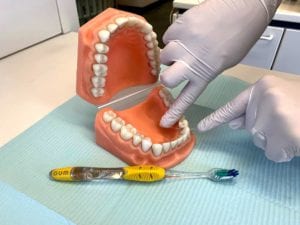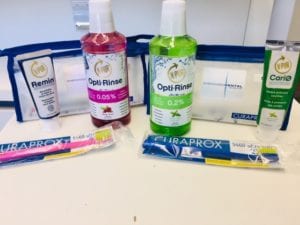
You may be a model dental patient. You may visit your dental hygienist every 6 months without fail, floss daily and brush with a Sonicare toothbrush in the morning and in the evening, and sometimes in between. Your dental hygienist may tell you how glad she is to see you and that she loves cleaning your teeth. She may tell you that because you do such an excellent job of cleaning your teeth, her job is easier to do. But would you be surprised to hear your dentist say, “You’ve got a cavity right here,” as he shows your digital x-ray on his computer screen? Would you be surprised to hear him tell you to schedule an appointment within the next week or two at the most, to get that cavity taken care of? Probably. I mean, you had no idea. You felt no pain. How could you have a cavity when your teeth don’t hurt?
How does a cavity form on a tooth?
Bacteria in your mouth form plaque, a sticky substance, which coats the surfaces of your teeth. Twenty minutes after eating or drinking food, this sticky substance feeds on simple sugars and simple carbohydrates found in your foods and creates plaque acid. Plaque acid dissolves your tooth enamel and a cavity develops.
If left untreated, a cavity eventually exposes the dentine making a tooth sensitive. Again, if left untreated, further decay will expose the tooth pulp where the nerves of your teeth are. If this happens, your tooth may become infected and cause extreme pain. Now you’re looking at the need for a root canal or possible tooth extraction.
And why should you visit your dental hygienist often?
The best way to prevent cavities from developing is to brush your teeth twice a day, floss your teeth once a day and limit the amount of sugary foods and drinks you eat. You should visit your dental hygienist as often as they recommend you should, too. Your hygienist will remove plaque buildup, deep clean your teeth and reach those spots you might be missing spots or are unable to reach.
Remember, you may have a cavity without any symptoms at all. It may even be quite advanced, and you don’t know it’s there. Your teeth may not hurt, but that does not mean you may not have a cavity. Your dentist can catch tooth decay early and treat it before it becomes painful and costly, so visit your dentist often.
If you are feeling pain, the cavity has already developed to a more serious level. It could be causing damage to the surrounding tissues and teeth requiring an expensive dental procedure. Come see us before that happens. Schedule a routine cleaning with one of our Sherwood Dental hygienists today at (780) 464-4166.



